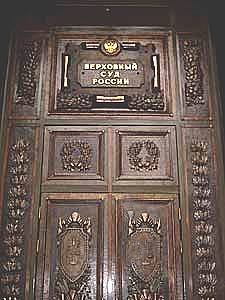Vyacheslav Lebedev, the chairman of the Russian Supreme Court, said Friday that Pasko's supervisory appeal will be considered by the Supreme Court Presidium. The decision taken by his deputy Nikolai Petukhov on December 24th seems thus, to have been overruled.
The supervisory appeal filed by Pasko’s lawyers will be considered by the 13 Supreme Court judges that are members of the Presidium. The Supreme Court Presidium is the highest judicial power of the Russian Federation.
No date has yet been set for the hearing, but the decision of the Presidium may lead to a reversal of the verdict that imprisoned Pasko, and legally clear his name.
Decisive amendments
The Pasko-defence team’s request for a supervisory review of the verdict of the Pacific Fleet Court that sent Pasko to labour camp, and the Supreme Court Military Collegium’s confirmation of this verdict was submitted on October 21st 2002.
On December 24th 2002, Nikolai Petukhov, the chairman of the Military Collegium, and a deputy of Mr Lebedev, decided that the conviction of Pasko was fully legitimate. Thus, Mr Petukhov refused to use his right to submit a supervisory appeal to the Presidium.
However, on January 1st 2003, amendments of the Russian Criminal Procedure Code entered into force, allowing consideration of cases by the Presidium based on the very fact that a supervisory appeal is submitted. Before January 1st only the Chairman of the Supreme Court, his deputies or the Prosecutor General could submit cases to the Presidium, but after that date the Presidium’s handling of a request for supervisory review no longer depends on the recommendations of its chairman, any of his deputies or the Prosecutor General.
Gates opened
Judged from Mr Lebedev’s statements, which have been quoted by several Russian new-agencies, it seems to be these amendments that now have opened the gates to the Presidium for Grigory Pasko.
Pasko also has an appeal pending before the European Court of Human Rights in Strasbourg regarding the violations of the European Convention on Human Rights that has occurred in his case.
Among those rights spelled out by the convention that were violated in the Pasko case are the right to determination of criminal charges within a reasonable time; the right to a fair trial; defences against being tried retroactively and under too extensive an interpretation of existing legislation; and the right to freedom of expression. Due to the Strasbourg Court’s heavy workload, the decision of these matters may however lie well into the future.
No appeal
In the meantime, Vladimir Ustinov, Prosecutor General of the Russian Federation, said it was inexpedient to file protest against the parole release of Grigory Pasko last week. Later Vladivostok region, or Primorye region, Prosecutor Office said that they had no intentions to reverse the parole release.
Grigory Pasko arrived to Moscow last Sunday and was met in the airport by national TV-crews and his supporters. He intends to live and work in Moscow or St Petersburg and work in Bellona’s Russian language magazine Ecology and Rights.




